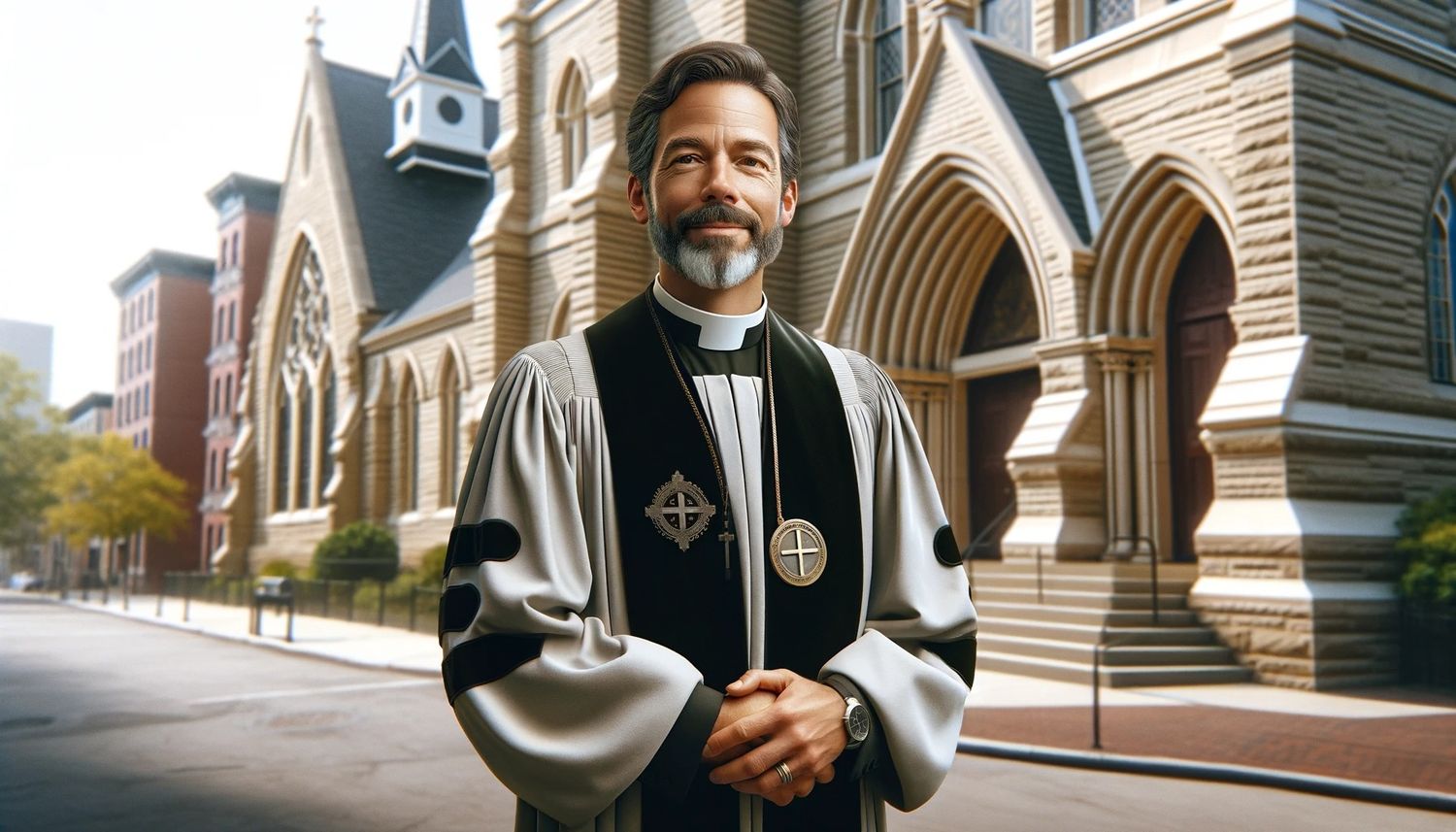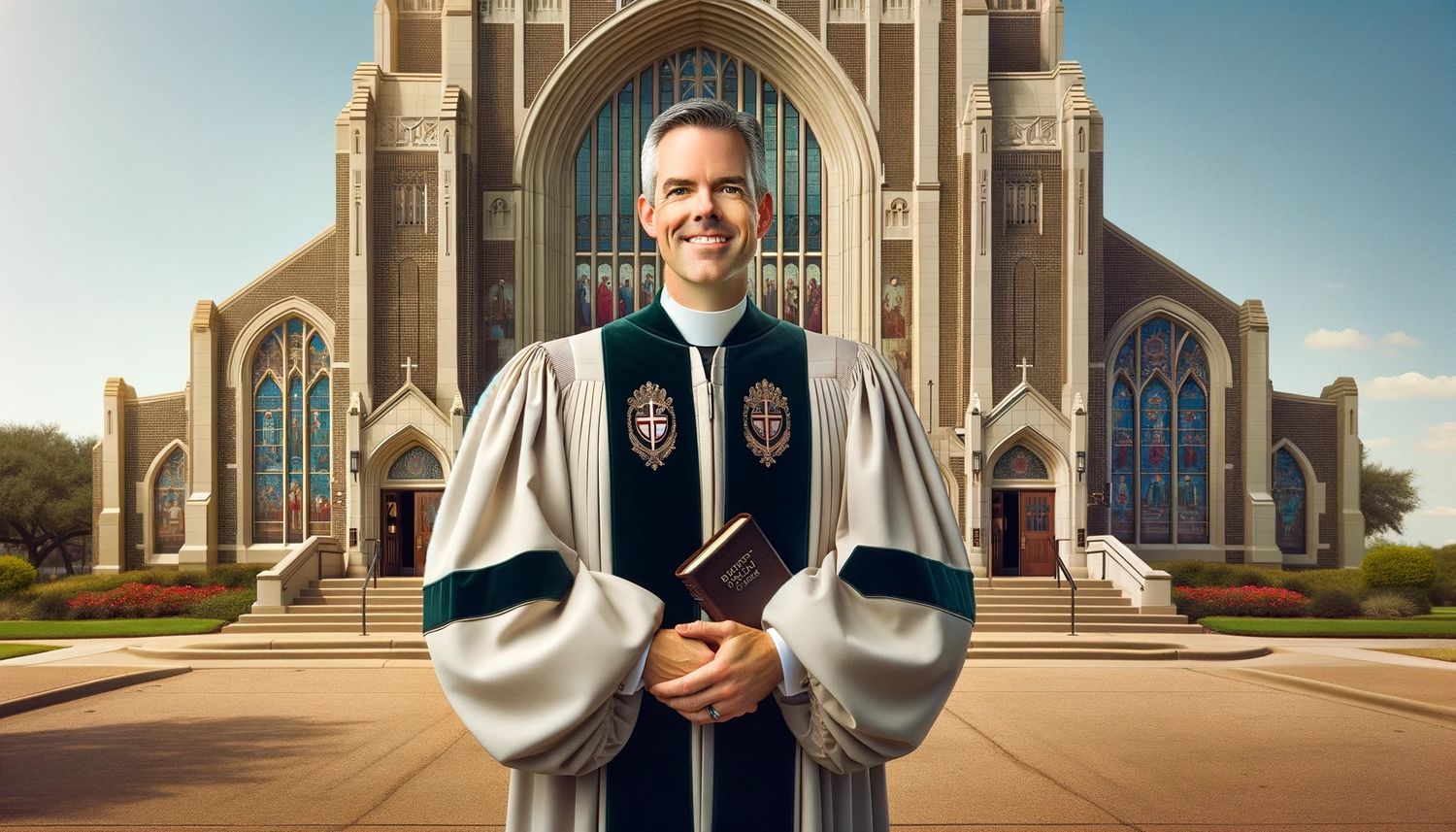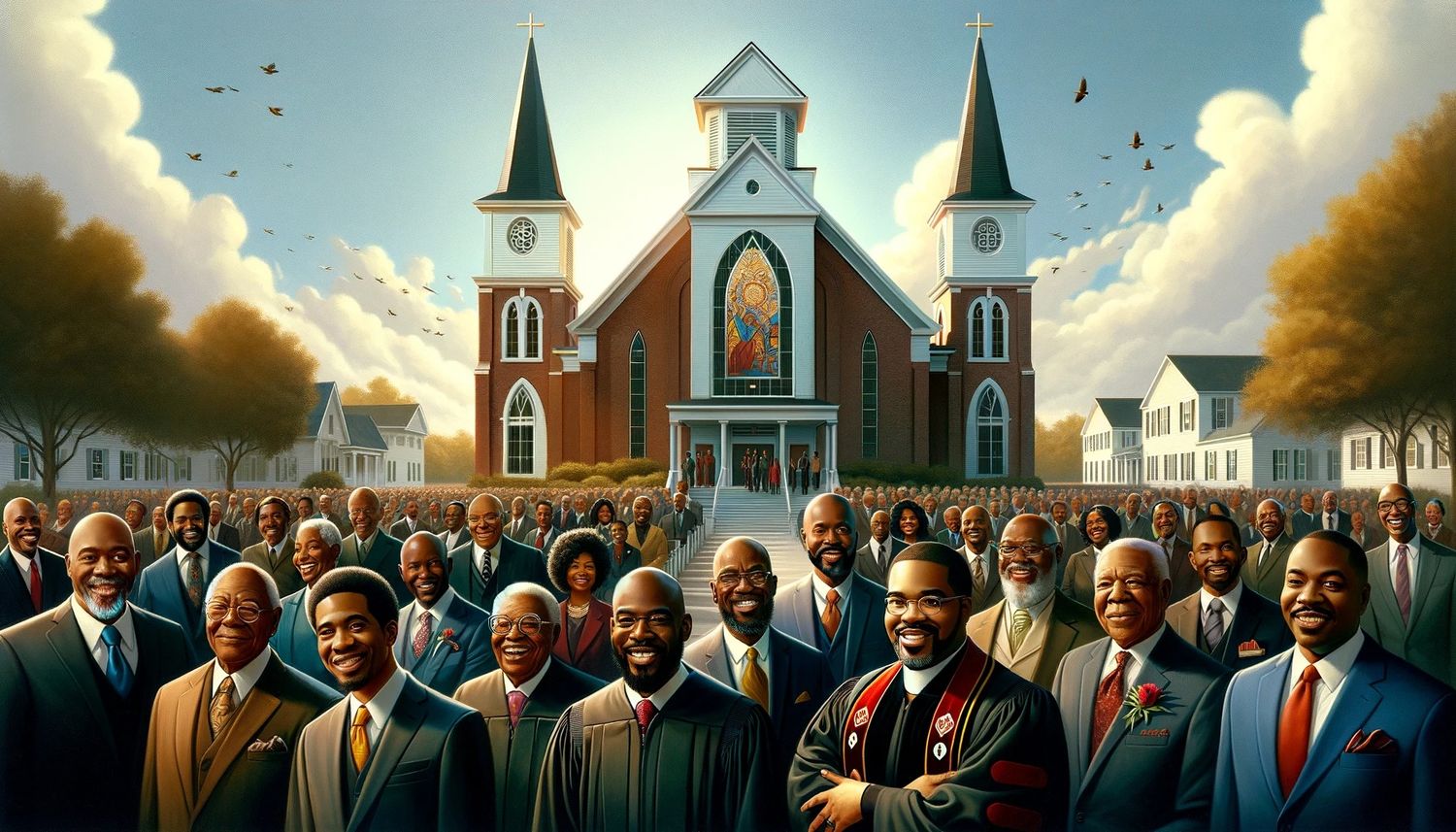Home>Theology and Spirituality>How To Select A Pastor For A Baptist Church


Theology and Spirituality
How To Select A Pastor For A Baptist Church
Published: February 23, 2024
Ericka Andersen, an editor at Christian.net, expertly merges digital strategy with content creation, focusing on faith and societal issues. Her communication skills enhance the platform's engaging narratives, fostering meaningful dialogue on belief's impact on society.
Looking for a new pastor for your Baptist church? Learn how to select a qualified candidate with a strong background in theology and spirituality.
(Many of the links in this article redirect to a specific reviewed product. Your purchase of these products through affiliate links helps to generate commission for Christian.net, at no extra cost. Learn more)
Table of Contents
Introduction
Selecting a pastor for a Baptist church is a pivotal decision that profoundly impacts the spiritual well-being and growth of the congregation. The process of choosing a pastor is not merely a matter of filling a position; it is a sacred endeavor that requires careful discernment, prayerful consideration, and alignment with the church's values and vision. The role of a pastor in a Baptist church extends far beyond delivering sermons and conducting religious ceremonies. A pastor serves as a spiritual shepherd, counselor, and leader, guiding the flock in their faith journey and providing support during life's challenges.
The task of selecting a pastor is a collaborative effort that involves the congregation, church leadership, and often, external advisors. It is a process that demands transparency, humility, and a deep understanding of the church's unique needs and aspirations. By approaching this process with reverence and diligence, a Baptist church can ensure that the chosen pastor embodies the values, beliefs, and mission of the congregation, fostering a harmonious and spiritually enriching environment for all members.
In the following sections, we will delve into the multifaceted aspects of selecting a pastor for a Baptist church, exploring the essential considerations, criteria, and steps involved in this significant undertaking. Understanding the role of a pastor, identifying the needs and values of the congregation, establishing selection criteria, seeking and evaluating potential candidates, and making the final decision are all integral components of this process. Each step is imbued with profound significance, as it contributes to the collective discernment and affirmation of the church's spiritual leadership. Let us embark on this enlightening journey, delving into the heart of selecting a pastor for a Baptist church.
Read more: How To Call A Pastor In A Baptist Church
Understanding the Role of a Pastor in a Baptist Church
The role of a pastor in a Baptist church is multifaceted, encompassing spiritual leadership, pastoral care, teaching, and community engagement. A pastor serves as a shepherd to the congregation, providing guidance, support, and nurturing spiritual growth. Central to this role is the proclamation of the Gospel, the administration of sacraments, and the provision of pastoral counseling and care.
In a Baptist church, the pastor is not viewed as an intermediary between God and the congregation but rather as a facilitator, encouraging each individual to develop a personal relationship with God. This emphasis on individual spiritual autonomy is a defining characteristic of Baptist theology and profoundly influences the role of the pastor. The pastor is tasked with equipping and empowering the congregation to live out their faith in their daily lives, fostering a community of believers who are actively engaged in their spiritual journey.
Furthermore, the pastor plays a crucial role in teaching and preaching, expounding on the Scriptures and offering insights that inspire and challenge the congregation. Through sermons, Bible studies, and theological discussions, the pastor helps the congregation deepen their understanding of the Christian faith and its relevance to contemporary issues.
In addition to spiritual leadership and teaching, the pastor provides pastoral care, offering comfort, guidance, and support to individuals and families during times of joy, sorrow, and crisis. This aspect of the pastor's role involves active listening, empathy, and a compassionate presence, reflecting the love and care exemplified by Jesus Christ.
Community engagement is another vital dimension of the pastor's role in a Baptist church. The pastor serves as a visible and accessible presence in the community, fostering relationships, collaborating with local organizations, and addressing social issues from a faith-based perspective. By actively participating in community initiatives and outreach, the pastor embodies the church's commitment to serving and impacting the broader community.
In essence, the role of a pastor in a Baptist church is characterized by servant leadership, spiritual mentorship, pastoral care, and community engagement. It is a calling that demands humility, compassion, wisdom, and a deep commitment to nurturing the spiritual well-being of the congregation and the wider community. Understanding the multifaceted role of a pastor is essential in the process of selecting a suitable candidate who embodies these qualities and aligns with the values and vision of the church.
Identifying the Needs and Values of the Congregation
Before embarking on the process of selecting a pastor for a Baptist church, it is imperative to gain a deep understanding of the congregation's needs and values. This foundational step involves active engagement with the members of the church, listening to their aspirations, concerns, and vision for the spiritual direction of the community.
Understanding the Congregation's Needs
To identify the needs of the congregation, it is essential to foster open and transparent communication. This can be achieved through congregational meetings, surveys, and individual conversations. By actively listening to the members, church leadership can gain insights into the specific areas where pastoral leadership and support are most crucial. Whether it involves strengthening youth programs, providing pastoral care for the elderly, or engaging in community outreach, understanding the congregation's needs is pivotal in selecting a pastor who can effectively address these areas.
Discerning the Congregation's Values
In addition to identifying needs, discerning the congregation's values is integral to the selection process. What are the core beliefs and principles that define the church's identity? Is there a strong emphasis on missions and outreach, a commitment to theological education, or a focus on nurturing a close-knit community? By exploring these values, the church leadership can align the selection criteria with the foundational principles that resonate deeply with the congregation.
Read more: How To Become A Baptist Pastor
Seeking Unity and Vision Alignment
Furthermore, the process of identifying the congregation's needs and values serves to foster unity and vision alignment within the church. As members collectively articulate their aspirations and values, a shared vision for the future of the church begins to emerge. This shared vision becomes a guiding light in the selection process, ensuring that the chosen pastor embodies the collective aspirations and values of the congregation.
In essence, identifying the needs and values of the congregation is a foundational step that sets the stage for the selection of a pastor. By actively engaging with the members, discerning their needs and values, and seeking unity in vision, the church leadership can lay a solid groundwork for the subsequent stages of the selection process. This intentional approach fosters a sense of ownership and unity within the congregation, ensuring that the chosen pastor resonates deeply with the collective identity and aspirations of the church.
Establishing Criteria for Selection
Establishing clear and comprehensive criteria for the selection of a pastor is a pivotal phase that demands careful consideration and discernment. The criteria serve as guiding principles that align the qualities, qualifications, and attributes sought in a potential pastor with the unique needs and values of the congregation. By delineating specific criteria, the selection process becomes transparent, intentional, and anchored in the collective discernment of the church community.
Spiritual Qualifications and Character
The spiritual qualifications and character of a pastor form the bedrock of the selection criteria. A pastor is called to exemplify the virtues of humility, integrity, compassion, and a deep commitment to spiritual growth. The criteria should encompass an assessment of the candidate's theological grounding, adherence to Baptist principles, and a demonstrated life of faith and service. Additionally, the pastor's ability to inspire and lead the congregation in spiritual formation and discipleship should be a focal point of the criteria.
Leadership and Communication Skills
Effective leadership and communication are essential attributes for a pastor in guiding and nurturing the congregation. The criteria should encompass an evaluation of the candidate's leadership style, ability to collaborate with diverse groups, and aptitude for fostering a cohesive and mission-driven church community. Furthermore, the pastor's communication skills, including preaching, teaching, and interpersonal communication, should be carefully considered to ensure the effective conveyance of spiritual guidance and pastoral care.
Read more: Who Is The Pastor Of Salem Baptist Church
Pastoral Experience and Counseling Aptitude
The criteria should include an assessment of the candidate's pastoral experience, including their capacity to provide compassionate care, guidance, and support to individuals and families within the congregation. A pastor's aptitude for pastoral counseling, active listening, and empathy is integral to addressing the diverse needs and challenges faced by the church community. The ability to navigate complex pastoral situations with wisdom, grace, and confidentiality should be a fundamental aspect of the selection criteria.
Alignment with Congregational Vision and Values
A crucial dimension of the criteria involves evaluating the candidate's alignment with the congregation's vision, values, and mission. The pastor should resonate with the core beliefs, aspirations, and unique identity of the church, fostering a sense of unity and shared purpose. The criteria should emphasize the candidate's capacity to integrate seamlessly into the church community, embracing its traditions, while also inspiring innovation and growth in alignment with the collective vision.
Commitment to Community Engagement and Outreach
The criteria should reflect the importance of community engagement and outreach, assessing the candidate's commitment to serving the broader community and addressing social issues from a faith-based perspective. A pastor's willingness to actively participate in community initiatives, collaborate with local organizations, and advocate for justice and compassion aligns with the Baptist tradition of social responsibility and service.
In essence, establishing criteria for the selection of a pastor is a deliberate and prayerful process that integrates the spiritual, relational, and missional dimensions of pastoral leadership. By delineating comprehensive criteria, the church leadership and congregation collectively articulate the qualities and attributes that embody the ideal pastor, ensuring that the selection process is rooted in discernment, unity, and a shared commitment to the spiritual well-being and growth of the church community.
Seeking and Evaluating Potential Candidates
Seeking and evaluating potential candidates for the role of pastor in a Baptist church is a process of profound significance, demanding discernment, prayerful consideration, and a deep understanding of the church's unique needs and aspirations. This phase involves actively seeking individuals whose qualities, qualifications, and calling align with the established criteria and the collective vision of the congregation. The search for potential candidates extends beyond reviewing resumes and conducting interviews; it is a spiritual endeavor that requires humility, transparency, and a reliance on divine guidance.
Prayerful Discernment and Exploration
The process of seeking potential candidates begins with prayerful discernment and exploration. Church leadership, in collaboration with the congregation, engages in fervent prayer, seeking divine wisdom and guidance in identifying individuals who embody the spiritual, pastoral, and leadership qualities essential for the role of a pastor. This phase involves exploring various channels, including networking within Baptist denominational circles, seeking recommendations from trusted sources, and actively reaching out to potential candidates who resonate with the church's values and vision.
Comprehensive Assessment and Dialogue
As potential candidates are identified, a comprehensive assessment process ensues, encompassing in-depth dialogue, reference checks, and a thorough review of the candidate's theological background, pastoral experience, and alignment with the church's values and mission. This phase involves engaging in meaningful conversations with the candidates, delving into their spiritual journey, calling to ministry, and their vision for serving as a pastor within the specific context of the congregation. Reference checks provide valuable insights into the candidate's character, pastoral effectiveness, and their ability to collaborate with diverse communities.
Congregational Engagement and Discernment
In parallel with the assessment process, congregational engagement and discernment play a pivotal role in evaluating potential candidates. The congregation is invited to participate in forums, meet-and-greet sessions, and opportunities to interact with the candidates, fostering a sense of ownership and unity in the discernment process. This engagement allows the congregation to gain firsthand experience of the candidates' relational skills, communication style, and their capacity to inspire and lead the church community. Feedback from the congregation contributes to the holistic evaluation of the candidates, ensuring that the collective discernment of the church is woven into the selection process.
Divine Confirmation and Decision-Making
Ultimately, the process of seeking and evaluating potential candidates culminates in seeking divine confirmation and making a prayerfully considered decision. Church leadership, in communion with the congregation, seeks clarity and affirmation through prayer, seeking divine guidance in discerning the individual best suited to shepherd the congregation. This decision-making process is marked by humility, transparency, and a deep reverence for the spiritual significance of selecting a pastor. The chosen candidate embodies the collective discernment and affirmation of the church community, reflecting a harmonious alignment with the church's values, vision, and aspirations.
In essence, seeking and evaluating potential candidates for the role of pastor is a sacred and collaborative endeavor that integrates prayerful discernment, comprehensive assessment, congregational engagement, and divine confirmation. By approaching this process with reverence and diligence, a Baptist church ensures that the chosen pastor resonates deeply with the collective identity and aspirations of the congregation, fostering a harmonious and spiritually enriching environment for all members.
Making the Final Decision
The process of making the final decision in selecting a pastor for a Baptist church is a culmination of prayerful discernment, collective affirmation, and a deep reverence for the spiritual significance of this pivotal choice. As the church leadership and congregation journey through the phases of identifying needs, establishing criteria, and seeking potential candidates, the moment arrives to prayerfully and decisively affirm the individual who embodies the collective discernment and resonates deeply with the values, vision, and aspirations of the church community.
The final decision-making process is marked by transparency, humility, and a steadfast reliance on divine guidance. It involves a comprehensive review of the discernment process, the insights gained from congregational engagement, and the alignment of the candidates' qualities and calling with the established criteria. The church leadership, in collaboration with the congregation, engages in fervent prayer, seeking divine clarity and affirmation as they prepare to make this momentous decision.
Furthermore, the final decision-making phase involves open dialogue and communication within the church community, fostering a sense of unity and shared ownership in the selection process. The congregation is invited to participate in forums, prayer gatherings, and opportunities to offer feedback, ensuring that their collective discernment is woven into the decision-making process. This inclusive approach fosters a deep sense of unity and affirmation as the church community prepares to embrace its chosen pastor.
Ultimately, the final decision is a sacred affirmation of the individual who has been prayerfully discerned and collectively affirmed to shepherd the congregation. It reflects the unity, vision alignment, and spiritual discernment of the church community, ensuring that the chosen pastor embodies the values, beliefs, and mission of the congregation. This decision is not merely a formality; it is a profound affirmation of the pastor's calling and the church's commitment to spiritual leadership and growth.
In essence, making the final decision in selecting a pastor for a Baptist church is a sacred and transformative moment, embodying the collective discernment, unity, and divine guidance of the church community. It marks the beginning of a new chapter in the church's journey, as the chosen pastor steps into a role of spiritual leadership, pastoral care, and community engagement, guiding the congregation in their faith journey and fostering a harmonious and spiritually enriching environment for all members.
Conclusion
The process of selecting a pastor for a Baptist church is a profound and transformative journey that embodies the collective discernment, prayerful consideration, and unity of the church community. From understanding the multifaceted role of a pastor to identifying the needs and values of the congregation, establishing criteria, seeking and evaluating potential candidates, and making the final decision, each phase of the selection process is imbued with spiritual significance and a deep commitment to nurturing the spiritual well-being and growth of the church.
As the church leadership and congregation engage in this sacred endeavor, they exemplify humility, transparency, and a steadfast reliance on divine guidance. The selection of a pastor is not merely a matter of filling a position; it is a calling to shepherd, guide, and inspire the congregation in their faith journey. The chosen pastor embodies the values, beliefs, and mission of the congregation, fostering a harmonious and spiritually enriching environment for all members.
The conclusion of the selection process marks the beginning of a new chapter in the church's journey. It signifies the affirmation of the pastor's calling and the church's commitment to spiritual leadership and growth. The chosen pastor steps into a role of profound significance, serving as a spiritual shepherd, counselor, and leader, guiding the flock in their faith journey and providing support during life's challenges.
In essence, the process of selecting a pastor for a Baptist church is a sacred and transformative endeavor that reflects the unity, vision alignment, and spiritual discernment of the church community. It is a testament to the church's commitment to nurturing a community of believers who are actively engaged in their spiritual journey, fostering a sense of unity, shared purpose, and a deep reverence for the spiritual significance of selecting a pastor.
As the chosen pastor assumes the mantle of spiritual leadership, the church community embarks on a journey of growth, renewal, and collective witness to the transformative power of faith. The pastor's presence becomes a beacon of hope, compassion, and spiritual guidance, inspiring the congregation to live out their faith in their daily lives and actively participate in the church's mission of love, service, and justice.
The conclusion of the selection process is not an endpoint but a sacred beginning, as the chosen pastor and the congregation unite in their shared commitment to spiritual growth, community engagement, and the enduring pursuit of God's purpose for the church.











